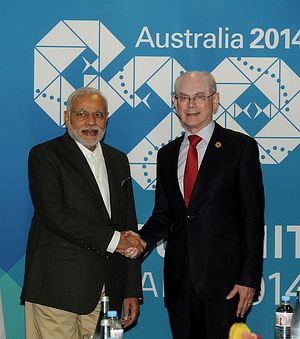At a recent business event in a major European city, a senior executive was heard to explain why his company did not do business in China. His main argument was economic: The Chinese market was crowded with competitors to midsize companies such as his. But the executive also said that he felt more comfortable doing business in democratic economies such as India, even if it takes more effort and time for projects to come to fruition.
While that view may be in the minority among corporate investors, it offers one more reason why India, the world’s largest democracy and a market economy set to be the world’s fastest growing by next year, should become a global economic hub without any further delay. In fact, the government of Prime Minister Narendra Modi is now moving to realize this ambition, and the world is showing renewed interest in the India story following the change in government last year. Yet the European Union remains an elusive and highly uncelebrated entity in Indian polity, business, and diplomacy.
For Modi, who came to power in a landslide election in 2014, improving India’s economy and its perception among foreign investors has been a top priority. During his first year, he traveled the world, including stops in France and Germany. The latter, of course, is Europe’s financial powerhouse, while the former has helped India with its military needs in past decades.
The Europe-India dynamic over the past few years has seen its shares of ups and downs. Recently, the negatives were highlighted when Brussels fumbled an opportunity to get Modi to make a pit stop there during his European trip. Beyond this, EU-India relations have often been sidetracked by other issues, such as the ghosts of the Bofors scandal from the 1980s emerging every now and then, or the very public case of the Italian marines deployed on anti-pirate duty aboard the oil tanker MT Enrica Lexie allegedly shooting dead two Indian fishermen. The legal fallout saw the European Union back Rome, and the case is now heading to international arbitration. Italy, of course, is a prominent EU member and the case has been a serious thorn in relations. Rome is adamant that the Marines be tried in an international court, while New Delhi maintains that the fishermen were shot in Indian waters and any sort of international arbitration would be seen as political interference in India’s internal affairs. The Lexie case was made all the more fraught for India domestically because it happened under the UPA government, led by the Congress party whose chief, Sonia Gandhi, is Italian born.
These prickly issues withstanding, the European Union has tried to take some modest steps to bring India closer both economically and politically. The word “strategic” is overused in modern diplomacy, usually in an aspirational sense, but the EU listed India in 2004 as one of the ten countries it has chosen as its “strategic partners” in the international community. Javier Solana, a distinguished fellow at the Brookings Institution and the former Secretary General of NATO, has called this selection of India as a “reasonable choice” given that it is the world’s most populous democracy.
Narratives such as this are not unusual in European socio-political circles, but they paper over some real weakness in the bilateral relationship. The fact that India’s economic potential, skilled worker base, business opportunities, and willingness to achieve rapid economic development are still largely overlooked explains why EU government and institutional understanding of the country remains largely poor, with some exceptions perhaps in the U.K., France, and Germany. Even within countries such as France and Germany, insight seems patchy.
Still, trade between Europe and India is rising steadily, from 28.6 billion euro ($31.8 billion) in 2003 to 72.5 billion euro in 2014. EU investment stock in India was 34.7 billion euro as of 2013, showcasing the gradually forward moving trend in EU-India relations. Nonetheless, the frustrations on the EU’s side remain evident: On the European Commission’s website, immediately after noting the above numbers, India’s economy and regulatory environment are still described as “comparatively restricted” on the back of its poor showing on World Bank’s Ease of Doing Business Index 2014.
The fact that the new government in Delhi has launched high-profile campaigns such as “Make In India” to boost foreign direct investment (FDI) and expand the economy, without orchestrating crucial institutional reforms within its ministries and bureaucracy to lay the groundwork exposes it to criticisms of indulging in mere PR. Despite this, India has attracted FDI ($34 billion according to reports) sufficient to enter the top ten list, and this only highlights the immense possibilities structural reforms in areas such as taxation could have for the Indian economy, specifically for sectors such as manufacturing, the only avenue for creating millions of needed new job opportunities.
The mooted changes to Indian diplomacy and bureaucracy include the strategic placement of industry experts in identified countries according to their industrial expertise, moving the Directorate General of Foreign Trade from under the Ministry of Commerce and Industry to the Minister of External Affairs (MEA), opening up hiring for the MEA to external expertise for full diplomatic placements in missions around the world, among others. While these reforms would seem obvious to many, they are easier said than done, particularly departing from the traditional hiring procedures for the foreign ministry, an idea that has met with considerable bureaucratic resistance.
India-EU relations as they stand today offer an ideal situation for the two sides to try out some path-breaking diplomacy to forward the relationship. The situation is particularly ripe for India, as reforms and modern diplomacy could work well in partnership with the EU, which in return offers very low political risk and potentially big economic and technological dividends.
Kabir Taneja specializes in South Asian foreign affairs, energy security and defense. He is currently a Visiting Researcher with the Fridtjof Nansen Institute, Norway. These are his personal views.

































